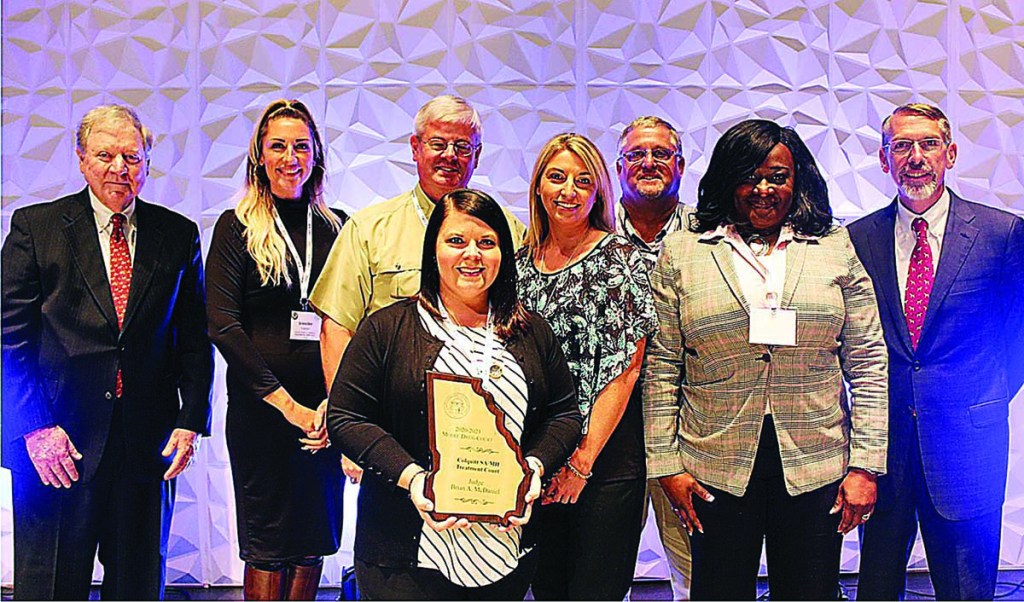Colquitt County court named Model Drug Court
Published 4:40 pm Tuesday, October 15, 2019

- Team members of the Colquitt County Substance Abuse/Mental Health Treatment Court pose with two judges from the Council of Accountability Court Judges after the council recognized the Colquitt County court as a Model Drug Court recently. From left are retired Judge Tommy Day Wilcox, Colquitt County Accountability Court Program Director Jennifer Fabbri, Judge Brian A. McDaniel, Rebecca Dalton of the Department of Community Supervision, Sgt. Jeff Faircloth of the Colquitt County Sheriff’s Office, Sherri laster of Georgia Pines, and Judge Reuben Green; and, center front, Colquitt County Assistant District Attorney April S. Hancock.
MOULTRIE, Ga. — The Colquitt County Substance Abuse/Mental Health Treatment Court in Moultrie has received quite a prestigious honor in being selected as the only Model Drug Court in Southwest Georgia.
Programs identified as “model courts” have met and exceeded adherence to Georgia’s standards as dictated by strong performance on certification and peer review processes.
“The Colquitt County Accountability Court is a drug treatment court where we treat individuals who currently have pending felony charges or are on probation. If we have someone who enters drug court, we are able to monitor their recovery,” said Jennifer Fabbri, program director of the Colquitt County Treatment Court. “We are able to get them into a rehab program, and they are overseen by Judge Brian McDaniels, myself, a probation representative, a public defender, a treatment court coordinator and a district attorney. They are getting the tools that they need during that 20- to 24-month program; some of them get their GED equivalents. The ultimate goal is to get them treated and off the streets.”
The goal of Georgia’s Accountability Court Model Court Program is to recognize the great work of accountability courts across the state, as well as identify strong programs that may serve as mentors for other courts, according to Rachel Gage, certification officer and instructor, in a press release.
“We only take individuals who have felonies; they reach out to the public defenders who then reach out to drug court. What I do is send a treatment coordinator to the jail and get a clinical on them before we accept them,” said Fabbri.
There are two tracks that an individual can fall into: the substance track and the mental track. The substance track focuses on repeat drug offenders with little to no history of debilitating mental health issues and focuses on treatment through group sessions, frequent drug tests and twelve-step therapies.
The mental health track is for individuals with a mental health disability, where many participants have overlapping substance abuse disorders.
According to Fabbri, the court accepts individuals who are truly suffering from an addiction, not those who are recreational users. The main focus is getting help to those who really need it in the community.
“We had our first court session in 2013. We’re sitting at about 30 individuals now; we are having grads about every three to six months. They can be as small as one individual and we’ve had as many as five at a time. Usually every month we are bringing new individuals in for treatment,” said Fabbri.
The program also partners with other local entities and groups such as Turning Point Hospital and Georgia Pines in an effort to ensure the individuals receive the substance abuse and mental health services and treatment they need.
“Drug court gave me the opportunity to change my life,” said Tommy Strickland, a graduate of the program. “Before it was started, with most people in the program, the only thing for them was prison. Prison’s not going to do anyone like that any good. Drug court gave me the opportunity to change my life. I’m very grateful and I’m still involved as far as trying to help people who come into the program. It’s pretty tough at first, but if you utilize it, it really makes a difference.”
Strickland has been out of drug court for two years and has since started his own business. He even married one of his fellow graduates, Shanna Strickland.
“They really care there. When you first start, your first instinct is to think that these people don’t care about you; it’s just a job to them. But that’s the farthest thing from the truth. They really do care about where you end up. I can see why the Colquitt County drug court was picked to be a Model Court,” said Strickland.





